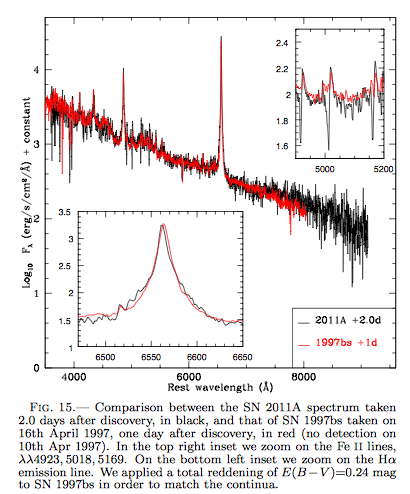Padova-Asiago Supernova Group
Highlights
SN 2011A: an low-luminosity interacting transient, with a double plateau and strong sodium absorption
de Jaeger, T. et al. 2015, A&A 807, 63 (link to pdf)
We present optical photometry and spectroscopy of the optical transient SN 2011A. Our data spans 140 days after discovery including BVRIugriz photometry and 11 epochs of optical spectroscopy. Originally classified as a type IIn supernova (SN IIn) due to the presence of narrow HLPH emission, this object shows exceptional characteristics. Firstly, the light curve shows a double plateau; a property only observed before in the impostor SN 1997bs. Secondly, SN 2011A has a very low luminosity (MV=-15.72), placing it between normal luminous SNe IIn and SN impostors. Thirdly, SN 2011A shows low velocity and high equivalent width absorption close to the sodium doublet, which increases with time and is most likely of circumstellar origin. This evolution is also accompanied by a change of line profile; when the absorption becomes stronger, a P-Cygni profile appears. We discuss SN 2011A in the context of interacting SNe IIn and SN impostors, which appears to confirm the uniqueness of this transient. While we favour an impostor origin for SN 2011A, we highlight the difficulty in differentiating between terminal and non-terminal interacting transients. 51
de Jaeger, T. et al. 2015, A&A 807, 63 (link to pdf)
We present optical photometry and spectroscopy of the optical transient SN 2011A. Our data spans 140 days after discovery including BVRIugriz photometry and 11 epochs of optical spectroscopy. Originally classified as a type IIn supernova (SN IIn) due to the presence of narrow HLPH emission, this object shows exceptional characteristics. Firstly, the light curve shows a double plateau; a property only observed before in the impostor SN 1997bs. Secondly, SN 2011A has a very low luminosity (MV=-15.72), placing it between normal luminous SNe IIn and SN impostors. Thirdly, SN 2011A shows low velocity and high equivalent width absorption close to the sodium doublet, which increases with time and is most likely of circumstellar origin. This evolution is also accompanied by a change of line profile; when the absorption becomes stronger, a P-Cygni profile appears. We discuss SN 2011A in the context of interacting SNe IIn and SN impostors, which appears to confirm the uniqueness of this transient. While we favour an impostor origin for SN 2011A, we highlight the difficulty in differentiating between terminal and non-terminal interacting transients. 51
